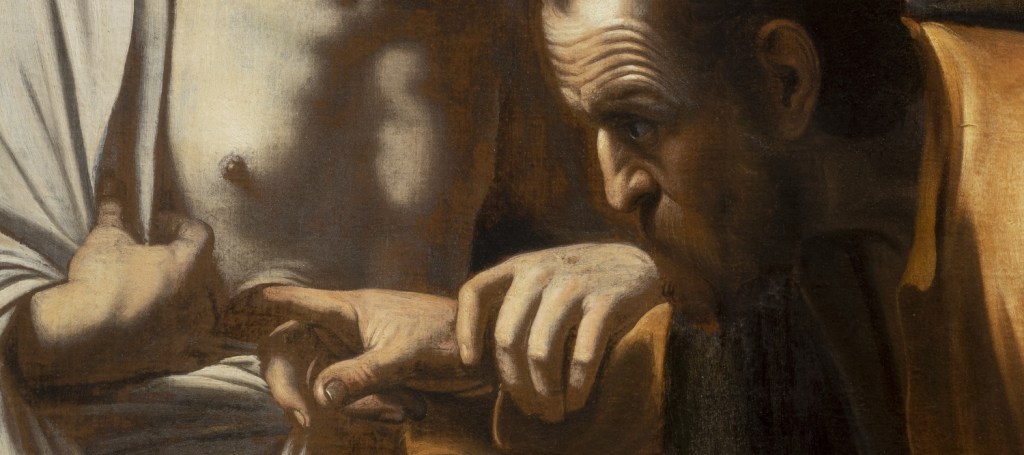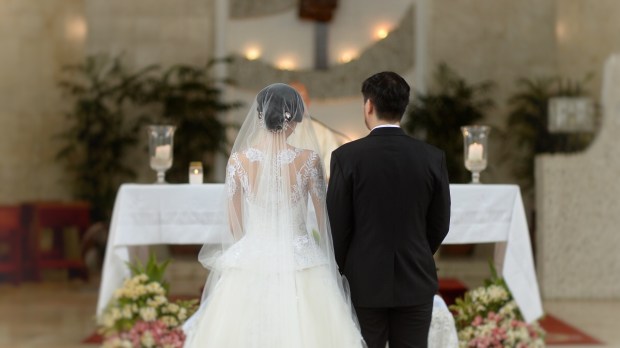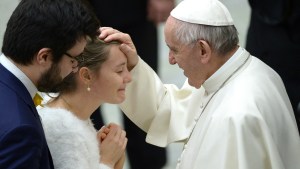I’ve been married now for 22 years. It’s a fact that surprises many people, mainly because I’m a married Catholic priest. Not everyone knows that the married priesthood exists within the Church. There’s also the fact that my wife and I seem young to be celebrating so many years together.
My wife and I were only 20 when we tied the knot. These days, that seems awfully immature to be so sure of a lifelong commitment. I’m sure that, if I had asked, multiple people would have counseled me to delay making such a big decision. After all, I was somewhat lacking in the maturity department.
Better to wait?
From time to time, I see advice floating around that it’s better to never marry young; that it’s necessary to gather more life experience, or date more people, or take some time for personal development (i.e., “me-time”) before making wedding vows.
Perhaps you’ve been the recipient of similar advice — that it’s too risky to put your faith in another person at a young age. (And the culture’s ideas of the age minimum seems to be creeping ever higher. It’s now in the 30s.) They say if you’re young, you never know what might happen as you mature. You never know if one of you might change. You never know if the person you married will become completely different. You never know.
When I preach at weddings, I often marvel that the bride and groom are willing to make such a huge commitment at all, regardless of age. I ask the couple if they’re aware that marriage is a cross, that they will have to share the TV remote, that they won’t always feel very much like they’re in love. One of them will inevitably eat the last bowl of ice cream or refuse to get up at 3 a.m. to help with the baby. And yet, despite all my cautions, couples keep making it through marriage prep, determined to present themselves at the altar for the sacrament of marriage.
These people still create life-long bonds. They still remain, decades later, happily (often even more happily) married.
Ultimately, the decision of two people to entrust their hearts to each other is a matter of faith. Faith is a firm assent of the mind to things unseen. It’s an intellectual decision that grasps onto a particular goodness that is, by definition, only partly understood or known.
In a marriage, having faith means being content with the fact that, despite all you might know about your spouse, in some sense they will always be a mystery.

The example of St. Thomas
This doesn’t mean that faith is a shot in the dark, though. Consider the example of St. Thomas, whose feast day is this week. Unfairly known as Doubting Thomas, he famously holds back. He says in the Gospel of John:
Unless I see the mark of the nails in his hands and put my finger into the nailmarks and put my hand into his side, I will not believe.
The response of Jesus is not to accuse Thomas of unfaithfulness or immaturity. He doesn’t inform Thomas that he isn’t ready yet to commit to being a Christian. Instead, Jesus supplies reasonable evidence. He lets Thomas touch his hands and side.
Notice, though, that this evidence is not scientific proof of the truth of the Gospel or the claims of Jesus to be the Messiah. It’s not proof of his descent into hell, or that he rose to Heaven, or that he had made possible the salvation of the universe.
So, when Thomas responds with joy, when he changes his life and dedicates it to founding the Church, when he himself becomes a martyr, he accomplishes all of this through faith. It’s a reasonable faith but, nevertheless, it is faith.
This is a good model for the type of faith that spouses ought to have in each other.
Accepting the evidence
When I made the decision at the recklessly young age of 20 to bind myself to the woman I love, I did so through faith. Leading up to that decision, I had come to know her character, how she responded to setbacks, how she behaved when we disagreed or when I needed to be forgiven. I’d seen how kind and considerate and gentle she was. There was much that she revealed to me as we spent time together, and I to her. Everything I saw of her made me love her more.
I had no clue what else I’d learn about her over subsequent years. I didn’t know how she’d be as a mother or how she would face unexpected challenges. I didn’t know if some life experience would change her entirely. But based on the evidence, I was eager to take the risk regardless of those unknowns. I had faith in her.
Faith isn’t blind, but it is very much open to possibility.
When it comes to having faith in your spouse, you won’t get a scientific demonstration, but it’s also not an unfounded opinion. There’s lightness and darkness to it. Faith isn’t blind, but it is very much open to possibility. This means that, every day, my wife and I are still growing in our mutual faith.
Now, after decades of marriage, I see how she parents teenagers, takes on new challenges, expand her interests. We communicate, share with each other, and live together in unity. Sure, everything could go sideways tomorrow — but my faith is stronger than ever that it won’t.
The habit of faith
Benedict XVI, in Spe salvi, says something interesting. He says that faith is a habit. This means we achieve faith over time by practicing it.
When we have doubts like St. Thomas, the best response is not to give up or refuse to take a risk, but to use reason and evidence to enlighten our faith. A husband and wife cannot know everything about each other. They probably never will. When considering committing to marriage, maybe doubts are legitimate, maybe they’re overblown, but the point is that faith is a method of knowledge. When it comes to having sufficient faith to be joined in holy matrimony, it’s by far our best method of knowledge. Faith, remember, is a reaching out to grasp an intuited goodness.
If we never make the leap, we miss out on so much goodness. But with faith in the right person, the reward is a life shared together, a constant adventure that becomes more rewarding every day.



